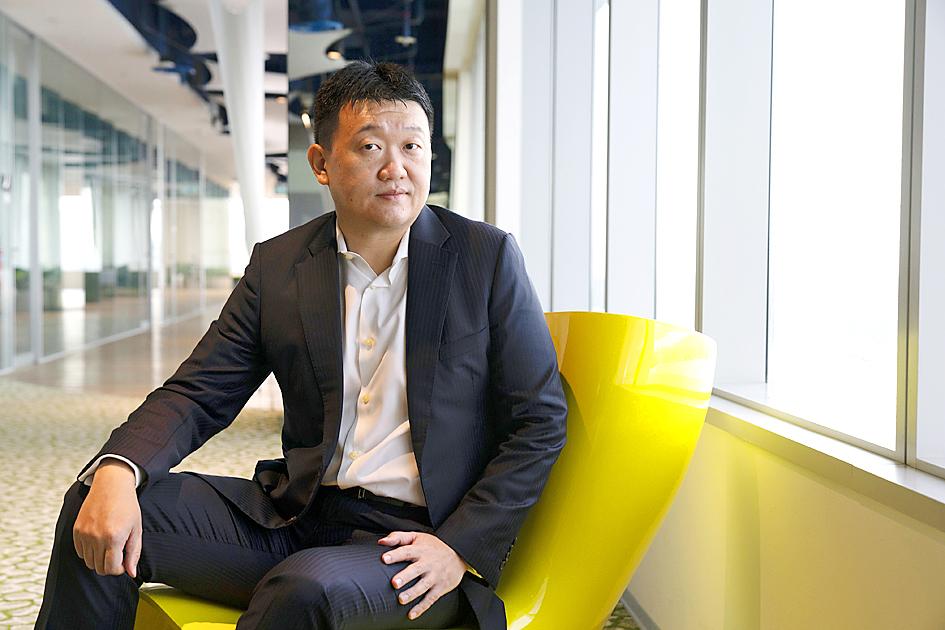Sea Ltd (冬海) aims to raise US$6.3 billion in the largest equity offering of this year, which would propel Southeast Asia’s largest company’s global expansion.
The online e-commerce and gaming firm backed by Tencent Holdings Ltd (騰訊) is offering 11 million shares, a stake worth about US$3.8 billion at Wednesday’s close in New York. It also intends to issue US$2.5 billion of equity-linked debt.
However, Sea shares, which have risen more than 70 percent this year, fell in post-marketing trading.

Photo: Bloomberg
The region’s most valuable company has rapidly expanded its market share in e-commerce and gaming during the COVID-19 pandemic, riding hit titles like shooter game Free Fire and its Shopee online shopping app.
Sea founder Forrest Li (李小冬) last month became Singapore’s richest person after shares of his company surged.
“Sea is going for a market expansion, especially in new businesses such as e-commerce in Latin America and food delivery in Southeast Asia,” said Sachin Mittal, an analyst with DBS Group Holdings Ltd. “Competition is intensifying, and gaining market share is of utmost importance.”
The 11 million shares that Sea is offering would be the biggest equity sale since Chinese e-commerce operator Pinduoduo Inc on Nov. 18 last year raised US$4.1 billion, data compiled by Bloomberg showed.
Including convertible bonds, the overall deal would be the biggest equity raise since the one by T-Mobile US Inc in June last year.
The deal, offered via Goldman Sachs, JPMorgan and Bank of America, comes at a time of resurgence in cross-border issuance from Asia.
Nio Inc (蔚來) on Tuesday announced plans to raise up to US$2 billion in what would be the biggest US offering by a company based in China since Didi Global Inc (滴滴).
Sea’s latest raising of capital follows a US$2.6 billion stock sale in December last year and a US$1.35 billion deal in 2019.
It would deploy the latest chunk of capital toward “business expansion and other general corporate purposes, including potential strategic investments and acquisitions,” the company said in a statement.
Sea last month raised its annual forecasts for its two main companies, underscoring its confidence in an expanding international business that is gaining momentum beyond its home region.
The stock has risen more than eightfold since the beginning of last year, as Sea invests cash generated from popular mobile battle royale game Free Fire to establish itself as an e-commerce leader in Southeast Asia. At the same time, it has expanded its online shopping business in Brazil as part of a strategy to become a global player, increasing competition with Latin American e-commerce giant MercadoLibre Inc.
In its home region, Sea remains locked in a fierce battle with GoTo and Grab Holdings Inc, which are bolstering their e-commerce and fintech offerings in one of the fastest-growing Internet markets on the planet.
Southeast Asia’s online spending is set to triple to more than US$300 billion by 2025, research from Google and its partners showed.
Sea is now turning to fintech for further growth beyond gaming and e-commerce, while also expanding beyond the region. It won a digital banking license in Singapore in December last year and acquired Indonesia’s PT Bank Kesejahteraan Ekonomi, better known as Bank BKE, people familiar with the matter said in January.

In Italy’s storied gold-making hubs, jewelers are reworking their designs to trim gold content as they race to blunt the effect of record prices and appeal to shoppers watching their budgets. Gold prices hit a record high on Thursday, surging near US$5,600 an ounce, more than double a year ago as geopolitical concerns and jitters over trade pushed investors toward the safe-haven asset. The rally is putting undue pressure on small artisans as they face mounting demands from customers, including international brands, to produce cheaper items, from signature pieces to wedding rings, according to interviews with four independent jewelers in Italy’s main

Japanese Prime Minister Sanae Takaichi has talked up the benefits of a weaker yen in a campaign speech, adopting a tone at odds with her finance ministry, which has refused to rule out any options to counter excessive foreign exchange volatility. Takaichi later softened her stance, saying she did not have a preference for the yen’s direction. “People say the weak yen is bad right now, but for export industries, it’s a major opportunity,” Takaichi said on Saturday at a rally for Liberal Democratic Party candidate Daishiro Yamagiwa in Kanagawa Prefecture ahead of a snap election on Sunday. “Whether it’s selling food or

CONCERNS: Tech companies investing in AI businesses that purchase their products have raised questions among investors that they are artificially propping up demand Nvidia Corp chief executive officer Jensen Huang (黃仁勳) on Saturday said that the company would be participating in OpenAI’s latest funding round, describing it as potentially “the largest investment we’ve ever made.” “We will invest a great deal of money,” Huang told reporters while visiting Taipei. “I believe in OpenAI. The work that they do is incredible. They’re one of the most consequential companies of our time.” Huang did not say exactly how much Nvidia might contribute, but described the investment as “huge.” “Let Sam announce how much he’s going to raise — it’s for him to decide,” Huang said, referring to OpenAI

The global server market is expected to grow 12.8 percent annually this year, with artificial intelligence (AI) servers projected to account for 16.5 percent, driven by continued investment in AI infrastructure by major cloud service providers (CSPs), market researcher TrendForce Corp (集邦科技) said yesterday. Global AI server shipments this year are expected to increase 28 percent year-on-year to more than 2.7 million units, driven by sustained demand from CSPs and government sovereign cloud projects, TrendForce analyst Frank Kung (龔明德) told the Taipei Times. Demand for GPU-based AI servers, including Nvidia Corp’s GB and Vera Rubin rack systems, is expected to remain high,